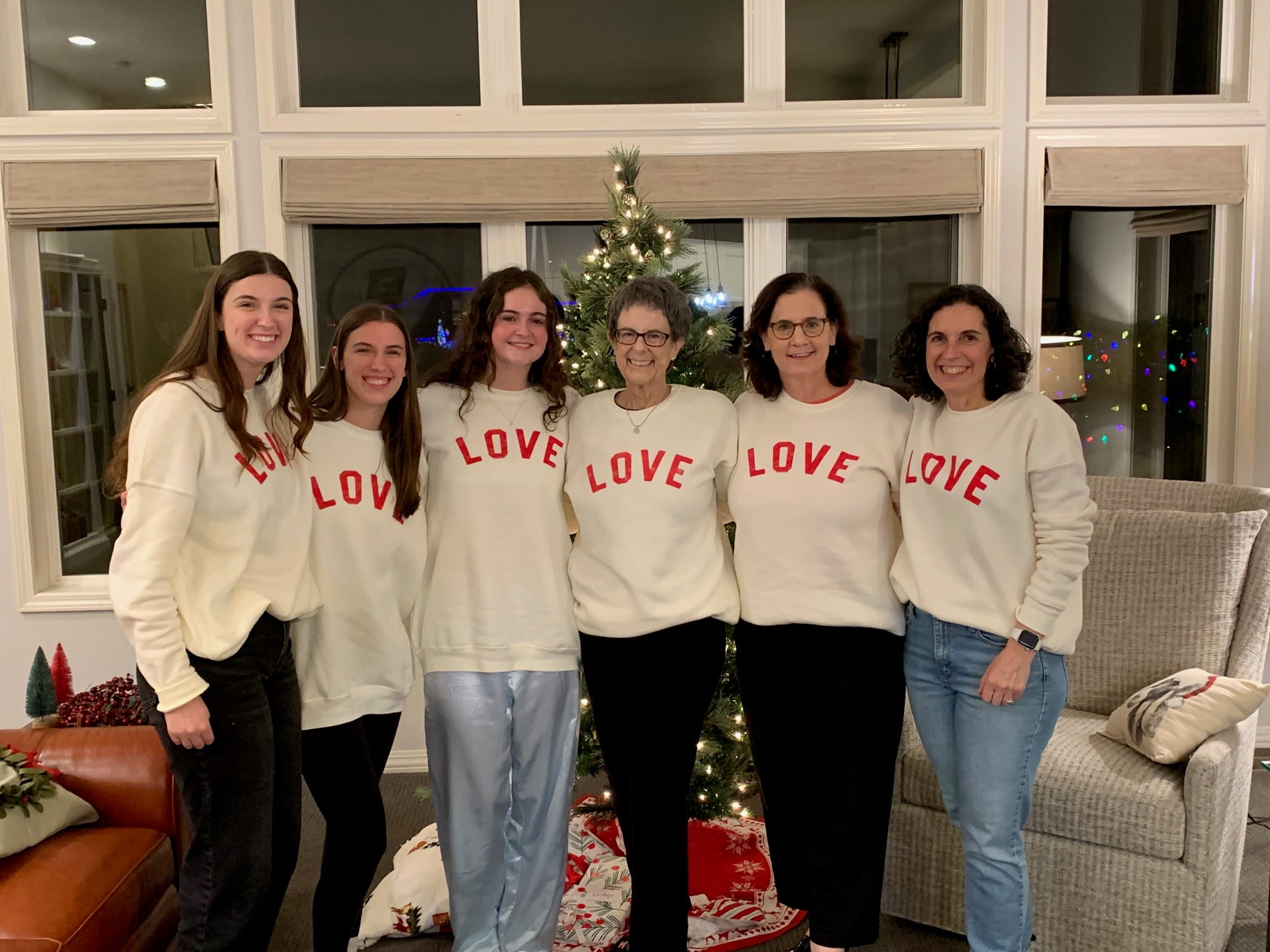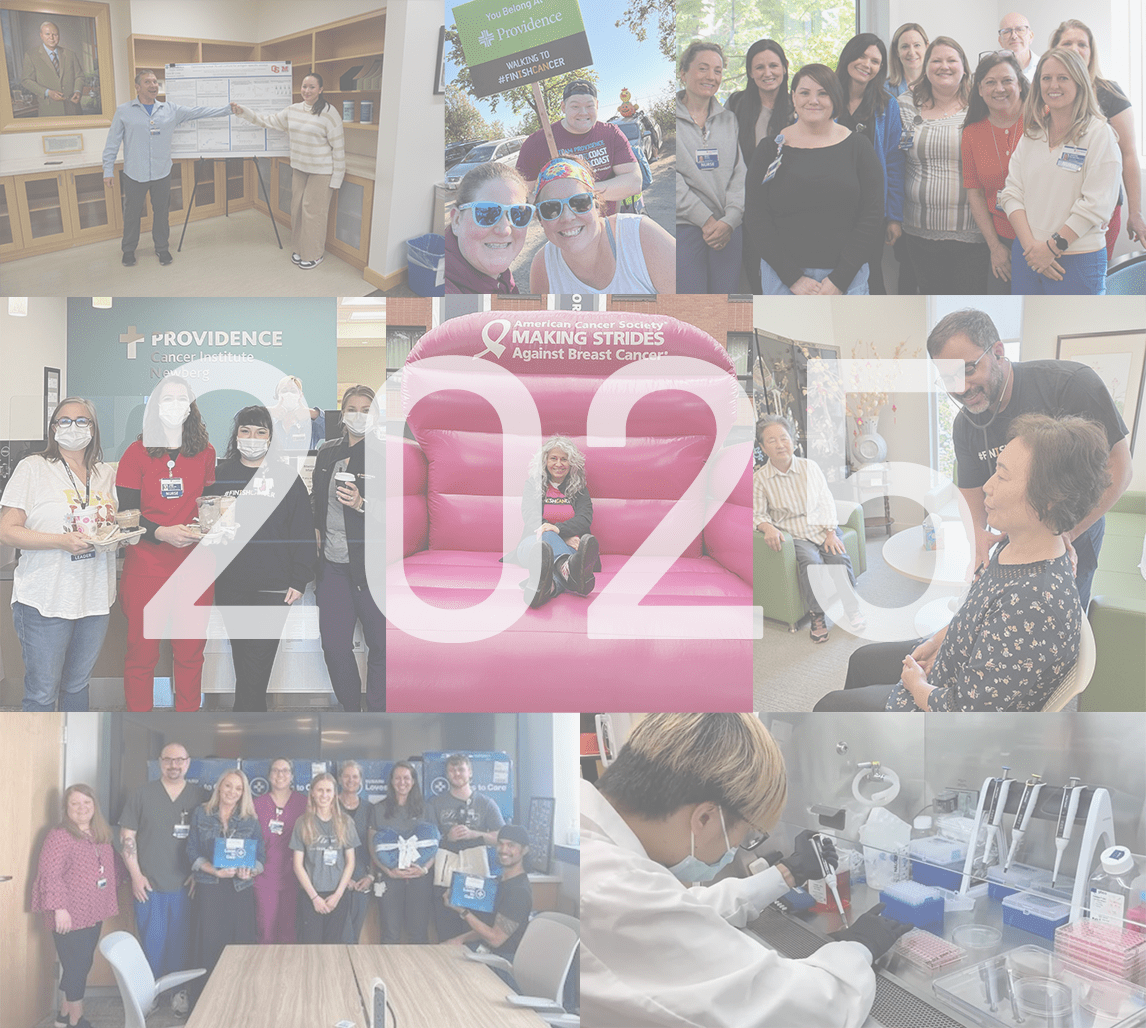Jenny’s story: A young mother’s journey through cancer and COVID-19
“I have a new perspective and appreciation for the simple, ordinary things of life."
When Jenny Edwards was expecting the birth of her fourth child, she knew it would be a special time for her family. The 38-year-old wife and stay-at-home mom could envision her life after pregnancy. Her heart was filled with a mother’s hopes and dreams, and she was busy making plans.
What she could not foresee were the health challenges she would soon face – through the COVID-19 pandemic and an unexpected cancer diagnosis – that would change her life and alter the plans of her growing family.
On January 6, 2020, Jenny and husband Michael welcomed healthy baby Benjamin into the world. Jenny was also doing well despite gastrointestinal complications. Toward the end of her pregnancy, she experienced intermittent pain and blood with bowel movements. Her doctor recommended further evaluation after the baby arrived. “We certainly didn’t feel like there was any reason to be alarmed,” said Jenny. Six weeks later, her symptoms continued, and a diagnostic colonoscopy was needed.
World upside down

“So much had changed in such a short period of time,” said Jenny. On March 18, 2020, Jenny remembers waking up from her colonoscopy, feeling disoriented and alone, to learn she had a 4-centimeter rectal tumor. Michael, who was waiting in the parking lot due to new safety protocols, had received the news by phone. "I felt like the floor dropped out from underneath me and I had no idea what I was supposed to do," she said. “It was a very overwhelming feeling.”
Subsequent biopsy and imaging confirmed stage III invasive colonic adenocarcinoma that had spread to a nearby lymph node. With no known family history of colorectal cancer, Jenny’s diagnosis came as a complete shock. To medical professionals, it is one instance in a worrisome trend of colorectal cancer in young people.
Colorectal cancer is the third most common cancer among men and women in the U.S. Although new diagnoses have dropped steadily among older adults, incidence of the disease is increasing in people aged 50 and younger. Screening is recommended to begin at age 45 or earlier for those with family history or other risk factors such as polyps or inflammatory bowel disease.
Community of care
Jenny was stunned and isolated, but she was not alone. A support system of family and friends from their church and school communities rallied around her. And Jenny found support in her medical team – doctors, nurse practitioners, oncology nurse navigators, oncology social workers, researchers, technicians, and others at her side every step of the journey.
Jenny met with Gina Vaccaro, M.D., Providence medical oncologist and medical director of Gastrointestinal Oncology Research. In consultation with Jeffrey Manchio, M.D., a Providence-affiliated colorectal surgeon at Colorectal Health Northwest, Dr. Vaccaro recommended the standard of care – chemotherapy and radiation to shrink the tumor, followed by surgery and more chemotherapy. She also offered Jenny the chance to participate in an immunotherapy clinical trial designed for people like her, one that was available only at Providence.
One-of-a-kind study
Providence medical director of Radiation Oncology Kristina Young, M.D., Ph.D., studies the effects of radiation and immunotherapy in cancer. She leads an investigator-initiated phase II clinical trial testing galunisertib, an experimental immunotherapy, for people with colorectal cancer.
Galunisertib attacks cancer at multiple levels, from mechanisms involved in cancer cell growth to the reinforcement of anticancer immune responses. When given as an immune-boosting treatment prior to standard care, galunisertib may help more people respond to therapy.
For Jenny, the decision was easy. The clinical trial offered an opportunity to increase her likelihood of a complete response with minimal risk or side effects. “It was presented very positively as something I could do and would be in addition to my treatment,” she said. “I didn’t ever feel like I needed to choose between a clinical trial or the traditional route, and that was very important for me.”
For two weeks, Jenny took galunisertib daily in the form of a pill. Then she started radiation and chemotherapy. When it came time for surgery, she had completed four weeks of immunotherapy concurrent with six weeks of chemoradiation and experienced few side effects.
Center of excellence
As Jenny prepared for surgery, her medical team prepared clinical regimens of the highest standards for the best possible outcome. Dr. Vaccaro and Dr. Manchio consulted with a multidisciplinary rectal cancer team of surgeons, pathologists, radiologists, radiation oncologists, medical oncologists, and nurses. Together, they reviewed Jenny’s case and were following her care closely.
This multidisciplinary approach is a hallmark of the rectal cancer program at Providence Cancer Institute. Providence is the first center in the Northwest to be accredited by the National Accreditation Program for Rectal Cancer, a quality program of the American College of Surgeons. Accredited centers voluntarily adhere to standards of program management, clinical services and quality improvement efforts that influence patient outcomes.
When Jenny underwent surgery with Dr. Manchio in August 2020, she also benefited from leading-edge, robotic-assisted surgical technology. Providence is among the elite centers offering minimally invasive surgery with the da Vinci Surgical System. Fewer, smaller incisions would help Jenny recover more quickly than traditional surgery.
And what her surgeons found was very promising: Jenny’s tumor had all but vanished. Her treatments had reduced the tumor to nothing more than residual, microscopic disease. Jenny completed another 12 weeks of chemotherapy to reduce the chance of cancer returning, and she has regular check-ups for cancer surveillance.
On April 7, 2021, one year since her initial diagnosis and a few months after her 40th birthday, a second colonoscopy revealed Jenny was disease-free. “The results were fantastic,” said Jenny. “I achieved the outcome we were hoping for."
When post-treatment symptoms of neuropathy arose, Jenny was connected with the Providence Integrative Medicine Program. “They were so knowledgeable and helpful. Doing acupuncture, and some chiropractic and massage, I really started to turn the corner,” she said. “I was getting back to feeling normal again, and stronger again.”
That summer, Jenny felt strong enough to participate in a local cancer awareness event. On August 7, 2021, she joined members of Providence Cancer Institute and Colorectal Health Northwest at Mt. Tabor Park for the ‘Get Your Rear in Gear’ 5K race benefiting the Colon Cancer Coalition. “I saw some of my care team at this event, and it reminded me they care deeply about their patients and the work they do,” said Jenny. “I hope to attend more events like this in the future.”
Share knowledge, spread hope
With cancer treatments behind her, Jenny wanted to know more about the possibility of an inherited risk of cancer for herself, her children, and her siblings. She pursued genetic risk counseling through the Providence Genetic Risk Clinic. She also elected for mammography and Pap smear screening of breast and cervical cancers.
Jenny learned about the importance of knowing her family health history. Unbeknownst to her, another relative was also diagnosed with colorectal cancer, and others were treated for breast cancer and lymphoma.
Now, in conversations with friends and loved ones, she has a new message to share: Pay attention to things that don’t seem right. “Don’t ignore it,” she said. “Don’t be embarrassed to talk with a doctor.”
Family will always be at the center of Jenny’s life, and she is eager to resume her role as caregiver. "My new normal is finding my groove again as a stay-at-home mom and taking back the responsibilities that others helped with during cancer treatment,” she said.
As she returns to plans that were put on hold, Jenny reflects on what has changed and what remains. “As time goes on and the cancer diagnosis and treatment begin to fade into the background, I have a new perspective and appreciation for the simple, ordinary things of life."



